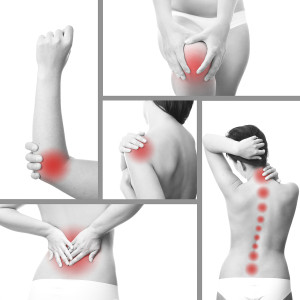
We’ve all experienced aches and pains from head to toe over the course of our lives. We may experience back pain after working in the yard, or our entire bodies could ache when we come down with the flu.
In the simplest of terms, myalgia is the medical term for muscle pain. Depending on the cause, myalgia can occur in a small or large area, on one or both sides of the body. The severity of muscle pain can range from mild soreness to sharp, excruciating pain.
There are many different types of myalgia, including polymyalgia, epidemic myalgia and fibromyalgia. Polymyalgia involves pain and stiffness in the neck, shoulder, arms and buttocks on both sides of the body and is usually accompanied by inflammation. Epidemic myalgia, or Bornholm Disease, is a viral form of myalgia that affects the upper abdomen and lower chest and often involves spasms, fever and headaches.
Fibromyalgia involves ongoing, dull pain in the joints, muscles and ligaments and is typically aggravated when pressure is applied. Fibromyalgia is often associate with conditions such as insomnia, irritable bowel syndrome, osteoarthritis, and even depression.
The most common causes of myalgia are overexertion, stress, trauma or injury, overcompensating for a separate injury, and chronic tension. It can also be caused by viral infections like the flu or Lyme disease and autoimmune disorders like multiple sclerosis.
One of more overlooked causes of myalgia is prescription drugs, which is why muscle pain is often misdiagnosed. In many cases, drugs are prescribed unnecessarily, and myalgia is a common side effect. Unfortunately, even regular exercise and stretching can’t stop pain caused by medication. Also, over-the-counter pain medications are taken like vitamins and have been scientifically linked to a number of diseases.
Prescription drugs that can cause myalgia include but are not limited to:
Part of the problem with these prescription drugs is that they not only cause myalgia, but they make us dependent on drugs and often cause more problems than they solve. Think about those TV commercials that spend 10 seconds talking about how wonderful a drug can make you feel, followed by 20 seconds talking about how the drug can make your life miserable.
This is why myalgia should be diagnosed by examining the whole person instead of simply popping a pill for every ill. In many cases, pain can be treated through clinical nutrition, personalized exercise and physical therapy, and natural methods such as massage and acupuncture.
If you experience some form of trauma or injury, or you notice muscle pain that lasts for more than a few days, take note of when the pain started, where you feel the pain, what the pain feels like, how long it lasts, how severe the pain is, your mental state, and what you can do if anything to make the pain go away.
The worst things you can do are accept myalgia as normal or assume it will eventually go away. That pain is your body’s built-in alarm system telling you that something is wrong. Schedule an appointment at Natural Healthcare Center. We can help you find out the cause of your pain and determine the safest, most effective treatment.